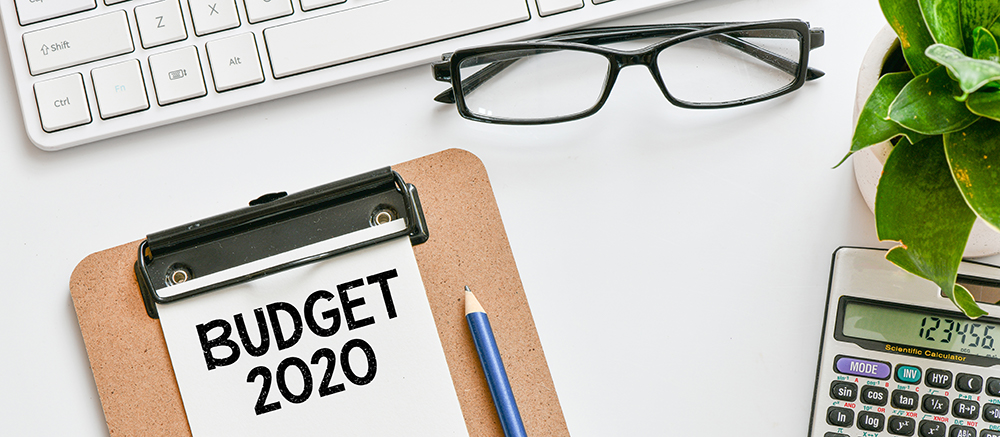Budget Briefing – 11th March 2020

The Chancellor has delivered the Spring Budget 2020; please find enclosed details of those policies that may affect our clients:
Budget Policy Overview
The Budget takes place against the backdrop of the global outbreak of COVID-19. The fundamentals of the UK economy are strong and the government is well prepared to protect people’s health and support their economic security throughout this period of temporary economic disruption. The Budget sets out a plan to support public services, individuals and businesses that may be affected by COVID-19.
The Budget announces investments in the roads, railways and digital networks that will underpin growth over the coming decade, as well as the world‑class hospitals, schools, colleges and police forces that people rely on every day.
The Budget also sets out a plan to invest in research and development (R&D) and cutting-edge technologies.
In the year that the UK hosts the COP26 UN climate summit, the Budget takes steps to decarbonise the economy and protect the UK’s natural habitats, ensuring that every part of the UK economy is ready for the challenges of decarbonisation and ready to capitalise on the opportunities to become leaders in the green markets of the future.
Energy and Environmental Taxes
The Budget announces a Carbon Capture and Storage (CCS) Infrastructure Fund to establish CCS in at least two UK sites, one by the mid-2020s, a second by 2030.
To encourage more environmentally-friendly ways of heating homes and other buildings, the government will also introduce a Green Gas Levy to help fund the use of greener fuels. The government will consult on introducing levy-funded support for bio-methane production to increase the proportion of green gas in the grid.
To encourage businesses to operate in a more environmentally friendly way, the government is raising the Climate Change Levy on gas in 2022-2023 and 2023-2024 (whilst freezing the rate on electricity) and reopening and extending the Climate Change Agreement scheme by two years.
The government will also support the installation of heat pumps and biomass boilers by introducing a Low Carbon Heat Support Scheme. The government will consult on introducing a new grant scheme from April 2022 to help households and small businesses invest in heat pumps and biomass boilers, backed by £100 million of new Exchequer funding.
Heat Networks
Recognising the energy efficiency benefits of heat networks, the Budget confirms funding for the Heat Networks Investment Project for a further year to 2022 and provides £270 million of new funding to enable new and existing heat networks to adopt low carbon heat sources.
Heat Networks Investment Project
The Budget confirms £96 million for the final year of the Heat Networks Investment Project, which ends in March 2022. After this, the government will invest a further £270 million in a new Green Heat Networks Scheme, enabling new and existing heat networks to be low carbon and connect to waste heat that would otherwise be released into the atmosphere.
Red Diesel
The government will promote air quality improvement by removing the entitlement to use red diesel except for agriculture, fish farming, rail and non-commercial heating from April 2022.
The Renewable Heat Incentive (RHI)
The government will extend the Domestic RHI in Great Britain until 31 March 2022. It will also introduce a new allocation of flexible tariff guarantees to the Non-Domestic RHI in Great Britain in March 2021, helping to provide investment certainty for the larger and more cost-effective renewable heat projects.
Aggregates Levy
The government will freeze the Aggregates Levy rate in 2020‑21 and will be publishing a summary of responses and government next steps to last year’s comprehensive review of the levy.
Climate Change Levy
The government will Increase the gas rates under the Climate Change Levy (CCL) for years 2022-2023 and 2023-2024. Building on the Budget 2016 announcement to make gas and electricity rates equal by 2025, the government is raising the rate on gas to £0.00568/kWh in 2022-2023 and to £0.00672/kWh in 2023-2024 whilst freezing the rates on electricity. To ensure the tax system treats fuels that are used off the gas grid more equitably, the government will freeze LPG at 2019-2020 levels until April 2024.
Climate Change Levy Main Rates
| Taxable Commodity | Rate from 01/04/2021 | Rate from 01/04/2022 | Rate from 01/04/2023 |
|---|---|---|---|
| Electricity (£ per kWh) | 0.00775 | 0.00775 | 0.00775 |
| Natural gas (£ per kWh) | 0.00465 | 0.00568 | 0.00672 |
| LPG (£ per kg) | 0.02175 | 0.02175 | 0.02175 |
Climate Change Agreement (CCA) Scheme
To support energy-intensive businesses to operate in a more environmentally sustainable way, the government will reopen and extend the CCA scheme by two years. The CCA scheme allows businesses to reduce their CCL bill in exchange for meeting targets to improve their energy efficiency. The terms of the extended scheme will be set out in a consultation to be launched shortly after Budget. As part of this, the government will simultaneously consult on long-term options for the CCA scheme.
Carbon price support (CPS) Rate
The government will freeze the rate of the CPS at £18t/CO2e in 2021-2022. Alongside wider carbon pricing policies, this will continue to encourage decarbonisation of the power sector.
UK Emissions Trading Scheme (ETS)
The government will legislate at Finance Bill 2020 to prepare for a UK Emissions Trading System (ETS), which could be linked to the EU ETS. The government will also legislate for a carbon emissions tax as an alternative carbon pricing policy and consult on the design of a tax in spring 2020.
If you have any questions regarding the Spring Budget and how it may affect you, please do not hesitate to contact us on 01293 521 350 or at info@2ea.co.uk.


